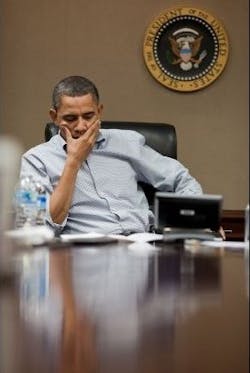Will tire tariffs be extended if law is passed?
The United States Congress has passed a bill giving the government broader powers when imposing duties on imports from non-market countries, like China.
The bill (H.R. 4105), which was passed by both houses, amends the Tariff Act of 1930 "to apply the countervailing duty provisions of the Tariff Act of 1930 to non-market economy countries, and for other purposes." It applies to all merchandise "which materially injures a U.S. or industry or threatens to."
If President Barack Obama signs the bill into law, it is likely the anti-dumping duty order on certain new pneumatic off-the-road tires will stand (click here for more information). The reasoning is that the U.S. Department of Commerce, which has yet to issue a final decision on the duties imposed on OTR tires in 2008, has wrestled with the legality of the duties.
On Oct. 7, 2011, the Department published its preliminary results of the administrative review of the antidumping order, which considered rescinding it in part (76 FR 62356). Two months later, a U.S. Court of Appeals for the Federal Circuit ruled that the U.S. Commerce Department's imposition of countervailing duties on China-made OTR and agricultural tires in 2008 was illegal under U.S. law.
"The court found no specific law written for what was going on," says Morry Taylor, chairman and CEO of Titan International Inc. Taylor was the cheerleader behind the original imposition of duties on OTR tires.
He told Modern Tire Dealer that H.R. 4105 clarifies the existing Tariff Act, and would make imposition of countervailing duties on OTR tires from China legal.
Taylor said he is normally against the government getting involved in trade matters. But the price inequity between OTR tires imported from China and other non-market countries and OTR tires produced in the U.S. makes the duties necessary.
"This is the best thing you're going to get out of a poor situation."
According to Baker & Hostetler LLP, a Washington, D.C.-based law firm that specializes in international trade law, the U.S. government sees China's economy as dominated by state-owned enterprises, making it a non-market country. China begs to differ, which could lead to conflict down the road.
The 25% tariff on passenger and light truck tires imported from China is a good example. It is scheduled to end Sept. 26, 2012.
However, Taylor said his lawyers believe H.R. 4105 would give the president control over that tariff, too, with some limitations.
For example, the "administering authority" would be required to reduce the antidumping duty if the non-market economy country in question has provided the merchandise with a "countervailable subsidy, other than an export subsidiary," or the subsidy has "reduced the average price of imports of that class or kind of merchandise during the relevant period."
